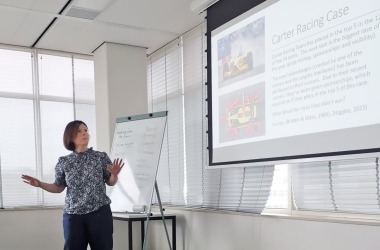What is Modern Leadership? Insights from Angela Vitiello's Guest Lecture

Vitiello explores modern, mindful, human-centred leadership and more
On 30 April, MBA (Master of Business Administration) students gathered at Wittenborg's Amsterdam study location for a special guest lecture by senior international consultant and social entrepreneur Angela Vitiello. The lecture focused on Leadership & Intercultural Competence in Business Management.
Vitiello, who is the founder and owner of Expat Parenting Collective and Vitiello Consulting, brings over 20 years of experience to the table. During her lecture, she explored leadership and the qualities of a good leader. Students were then tasked with working in groups of five to analyse the famous "Carter Racing" case study.
This case study addresses various principles of leadership and goes as follows: Despite consistently ranking in the top 5 in 12 out of 24 races, the Carter team encounters setbacks due to recurring engine failures. The introduction of a new turbocharger led to recent success, attracting sponsorships dependent on their performance in the upcoming race. This creates a dilemma for the team, who has to decide whether to race or withdraw.
Through this case study, Vitiello explains the importance of data and, ultimately, modern leadership.
"'Leadership for the Future' is a modern way to look at being a leader. It’s understanding that we all have a variety of ways of looking at things or that hold us back, such as biases, anchors, framing information, confirmation traps, time pressure, cultural upbringings and so much more, and that requires a balance of hard and soft skills. A modern leader considers all different types of data: numbers, asks for people’s thoughts and gut feelings and looks to validate those intuitions."
Vitiello also shared two real-life examples of modern leadership during her lecture.
In the first example, she discussed a food recall incident in the FMCG (Fast-Moving Consumer Goods) sector. During this crisis, leaders were required to gather information, facilitate open discussions and make decisions under pressure. Vitiello highlighted the significance of embracing ambiguity and creating space for clarity amidst uncertainty.
The second example involved a managing director mentoring a struggling employee in a sales organisation. When the employee admitted to not completing assignments due to personal struggles, instead of reacting negatively, the director paused, listened attentively and showed empathy
"In the world we live in, leaders need to be adaptable and change with it. Firstly, we can come up with tens of thousands of definitions of 'leader', yet everyone will always remember the 'good leader': how someone made you feel. Secondly, the body is not just a mechanism to support the head. The mind is valuable, but the body is too. Feelings are data. Your employees will have these feelings and intuitions as well, even about important decisions. Make sure their input is valued or you lose out on what is potentially incredibly insightful, as too many employees are afraid to speak up because they lack evidence or fear being labelled as emotional.
"Lastly, our mind narrows under stress. Often taking a step back, reflecting, towards the immediate decision allows a leader to make the best decision for the organisation."
Vitiello noted that students were particularly interested in the notion that "organisations don’t care about lives or people. They care about profits." Additionally, they were interested in exploring hard skills and soft skills, particularly questioning the extent to which soft skills should be prioritised.
"Too many leaders forget that their employees are human. We all have different things going on, stressors in our personal lives and to perform at work. However, if we care about our employees and the world we live in, people will be happier at work, we will consult and value our employees’ input, and fewer employees will be going out on burnout and employee retention will be higher."
She hopes that the students learned a thing or two about modern leadership. "A modern definition of leadership allows one to use the more traditional business skills as well as soft skills, allowing for a potent combination of mind and body. This is what I call modern, mindful, human-centred leadership."
Dr Shohreh Parham, Associate Professor of Applied Sciences at Wittenborg, said that Vitiello's guest lecture shed light on the complexity and challenges leaders face today and how they can navigate these with agility:
"This session was not just an opportunity to learn about leadership but also a chance to reflect on how we, as emerging professionals, can embody these traits. Thank you, Angela, for inspiring us to think deeply about our future roles in leadership!"
WUP 16/05/2024
by Erene Roux